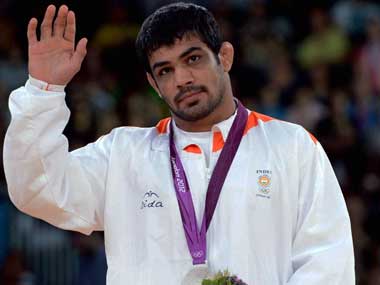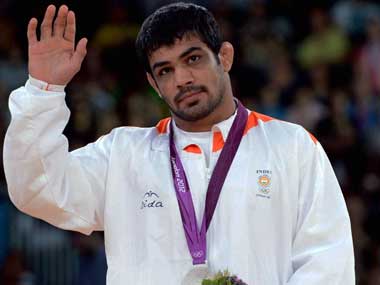At the 2014 Commonwealth Games in Glasgow, India won a total of 64 medals, 13 of which came from the 14-member wrestling contingent alone. That was a worthy contribution to the overall tally that helped India finish fifth on the leaderboard in the multi-sport extravaganza. What the numbers also reaffirmed was India’s dominance on the wrestling mat when it came to the Commonwealth nations.
Wrestling, along with shooting and weightlifting, has been India’s lead event at the Commonwealth Games. And while the latter sports have already played a huge role in India’s medal rush at Australia’s Gold Coast, it is time for the wrestlers to flex their muscle on the mat.
The wrestling events commence on Thursday and India will start as favourites in almost all weight categories. In the Asian Games, there are tough opponents like Iran, Kazakhstan, Uzbekistan, Japan and China to contend with. But at the Commonwealth Games, India is the team to beat.
[caption id=“attachment_3053926” align=“alignleft” width=“380”]  File image of double Olympic medal winner Sushil Kumar, who will lead India’s line. PTI[/caption]
Along with Canada and Nigeria, India is the only country to have representation in each of the 12 weight categories (among men and women) that will be contested at this edition of the Games. Even hosts Australia have managed to put up only seven wrestlers. As such, India’s only serious contest comes from Canada and Nigeria, and even then, only in some events.
Wrestling is not a strong suit of the Commonwealth countries, which is why some of the bigger sporting nations use it more as a training ground for their youngsters rather than aiming for medals.
Impact Shorts
More ShortsThe legendary Sushil Kumar, a double-Olympic medallist, is now competing in the 74kg category. And just as in Glasgow, he’s the favourite to win a third straight Commonwealth Games gold medal. He had won in the 66kg category in New Delhi in 2010 as well.
However, the only athlete who is expected to present the Indian veteran with any scope of a contest is 23-year-old Canadian Jevon Balfour, who won silver in the 65kg category in Glasgow. Baflour finished seventh at the Junior World Championships that same year.
Also in the field is 27-year-old Pakistani Muhammad Asad Butt, who won a bronze in freestyle as well as Greco-Roman at last year’s Commonwealth Championships in Singapore.
The women’s 53kg event presents India with another good chance of lifting gold, with Babita Kumari leading the field. The 28-year-old’s fame reached astronomical heights after the release of Bollywood film Dangal, that was based on her family’s story, especially elder sister Geeta and father Mahavir Phogat.
Her record at the Commonwealth Games includes a silver at New Delhi 2010 and gold at Glasgow 2014. But at Gold Coast, in an event that includes just five wrestlers, Babita seems to have no opposition.
Her younger cousin Vinesh Phogat may potentially have an even easier route to a medal. For, in the women’s 50kg category, there are only four competitors, and a single win will ensure her a medal. Phogat will face some competition from Canada’s Jessica Macdonald and Australia’s Indian-born wrestler Rupinder Kaur. While Macdonald won bronze in, Kaur is a multiple national champion in Australia and competing in her second Commonwealth Games.
Phogat suffered a minor abdominal injury before leaving for Gold Coast. Her 2016 Rio Olympics campaign came to a painful end when she was stretchered off after a knee injury against Sun Yanan of China.
Having undergone surgery, the 23-year-old returned to the mat last year and has had a few encouraging results. She also won a silver medal at the 2017 Asian Wrestling Championships in New Delhi.
In the men’s section, Bajrang Punia is a potential gold medal contender as well. The 2013 World Championship bronze medallist leads the charge in the 65kg category. His main threat is Nigerian Amas Daniel, whose only international accolade came in his third placed finish at Delhi 2010.
Meanwhile, 2016 Rio Olympics bronze medallist Sakshi Malik, who became the first Indian woman grappler to win an Olympic medal, has a tricky roster to deal with after she moved up to the women’s 62kg category. Only five wrestlers are competing in her weight category, but while Malik does possess a medal of a greater value, she also has three potentially strong opponents to cope with before she can secure another medal to accompany the silver she won four years ago.
Two of those opponents though, Malik will know well from her days in Glasgow, given that they were in the same roster as the Indian. Tayla Ford of New Zealand had reached the semi-finals at the last Commonwealth Games, earning a bronze after losing to Nigeria’s Aminat Adeniyi, who went on to beat Malik 10-0 to win the gold in the final.
But Canadian Michelle Fazzari will be a tough nut to crack. The 30-year-old, who was once ranked World No. 2, won bronze at the 2017 Paris World Championships in the 58kg weight category.
As for the men’s 125kg event, Sumit Malik too faces a fairly competitive field. Defending champion from Canada, Korey Jarvis, who had also won silver at Delhi 2010, will feature at Gold Coast. As will Nigeria’s Sinivie Boltic, the bronze medallist at Glasgow and gold winner in the 96kg event at Delhi 2010.
However, there aren’t too many rivals who can threaten India’s might on the mat. The challenge, though, remains in how they can use the success at Commonwealth Games to put up a better show at the Jakarta Asian Games later this year, and ultimately, at the 2020 Olympics in Tokyo.
While the contingent at Glasgow managed 13 medals, the team that later traveled to Incheon for the 2014 continental event returned with five medals — from a squad of 11 — including just one gold medal. At Rio, they had only one medal — Malik’s historic bronze — to show.
That knowledge itself might be enough to temper the hype that threatens to take over India’s seemingly inevitable success.


)

)
)
)
)
)
)
)
)



